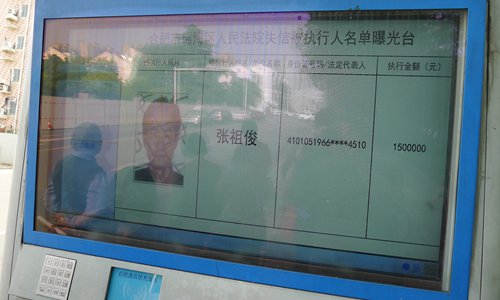HOME >> CHINA
Hangzhou court offers reward for reports of discredited entities on WeChat
By Ji Yuqiao Source:Global Times Published: 2019/9/18 22:23:40

Personal information of a discredited person is displayed at the bus stop in Hefei, East China's Anhui Province. Photo: VCG
A court in Hangzhou posted rewards on the WeChat moments platform to encourage reports of discredited entities.
The idea is to use the social media platform to precisely deliver the reward announcement through advertising exposure, according to a report by hangzhou.com, a local news website.
WeChat moments is a social platform for people with close relations, so it can expose discredited entities more efficiently through posting their personal information and reward notices on it, and it can also force them to abide by obligations to face the music, the Qianjiang Evening News reported.
The court, in Jianggan district in Hangzhou, East China's Hangzhou Province, posted a notice of rewards for the first phase of five discredited entities on Thursday.
The notice includes the discredited people's name, gender, and home address, as well as fines. And at the same time, it also noted the reward guarantees and conditions.
According to the report, the reward comes from the fine after the court receives the whole penalty.
One of the executive judges in the Jianggan court said that when posting the notice, they choose people who can see the reward advertisement in accordance with two standards.
One kind is those who have close relations with discredited people such as their families and friends, and the other is those who live or work in the area three to five kilometers away from the homes and work places of the discredited, including strangers.
The court regulated that the amount of the reward should be 5 percent of the fine. For example, if a discredited person gets a fine of 170 billion yuan ($23.9 million), the informer can get about 8.9 million yuan as a reward.
The court listed some situations in which informers cannot get reward money, including when the informer is a staff member of the people's court.
Some Chinese netizens questioned on Sina Weibo whether revealing personal information on social media is a violation of privacy and reputation rights.
However, Wang Fu, a Beijing-based lawyer disagrees. "These discredited entities refuse to fulfill their obligations and accept lawful punishment, so it is a consequence they have to take," Wang told the Global Times on Wednesday. "I do not think this action violates privacy and reputation rights of entities breaking the law."
Wang added that the court should deal with these discredited entities according to their conditions. "Some of them are unable to comply with the judgment as they are ill or their life condition is too difficult. The court should consider these situations before posting on social media."
Hangzhou's court is not the first one to use this method. Another people's court in Nanning, capital of South China's Guangxi Zhuang Autonomous Region also placed advertisements on WeChat moments to post blacklists of discredited entities, the Paper reported in December 2017.
The report said that after the photos were shown on WeChat, many discredited people rushed to the court and asked to pay the fines.
Posted in: SOCIETY